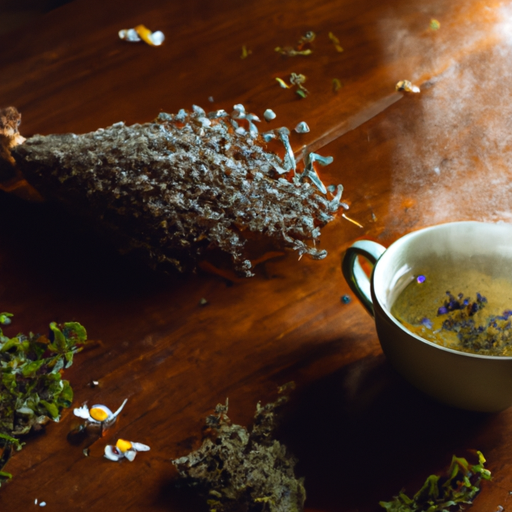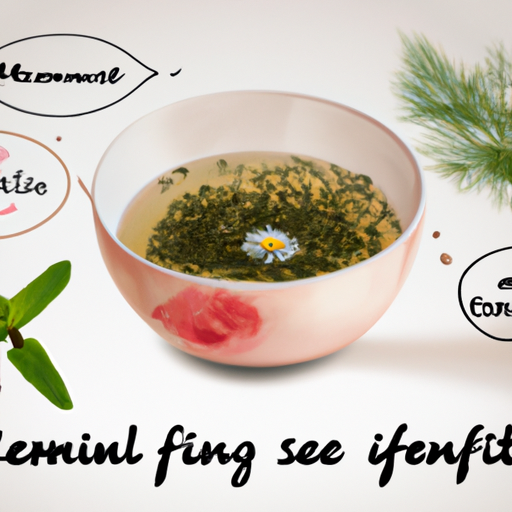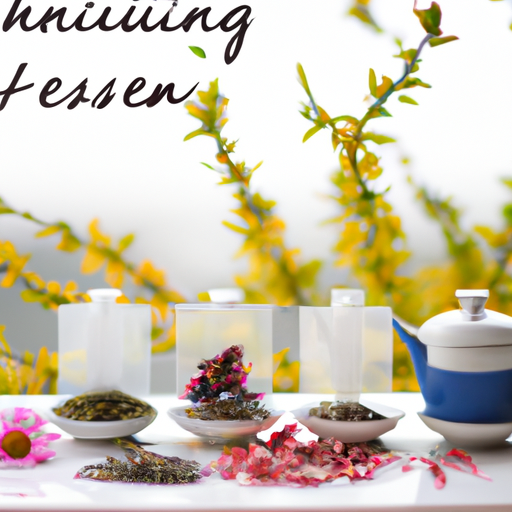When it comes to soothing a persistent cough, the most basic solutions are often the most powerful. If you’re looking for natural relief without any added chemicals, there are simple remedies that can work wonders for you. Remember, sometimes the best solutions are right in front of us!
Picture this: a cozy cup of herbal tea, steam rising gently, soothing your throat with every sip. Sounds comforting, doesn’t it?
Well, it turns out that herbal teas can do more than just warm your hands—they can actually help alleviate your cough.
In this article, I will guide you through a holistic and evidence-based approach to finding the right herbal tea for your cough.
From the refreshing minty taste of peppermint tea to the soothing properties of chamomile tea, each herbal infusion offers unique benefits.
We’ll explore the healing powers of ginger, the soothing effects of licorice root, and the invigorating aroma of eucalyptus.
We’ll also discover the antibacterial properties of thyme and the classic combination of honey and lemon.
So, if you’re ready to discover nature’s remedies for cough relief, let’s dive into the world of herbal teas together.
Key Takeaways
- Peppermint tea: Relieves cough symptoms and clears airways, contains menthol, a natural decongestant, and has anti-inflammatory properties that reduce throat inflammation.
- Ginger tea: Supports the immune system, has anti-inflammatory properties, suppresses coughing, soothes an irritated throat, and opens up airways for better breathing.
- Chamomile tea: Calming effects, relieves coughs and sore throats, has anti-inflammatory properties, boosts the immune system, and reduces inflammation in the respiratory system.
- Licorice root tea: Loosens mucus with expectorant properties, soothes the throat, reduces inflammation, and fights viral infections with antiviral properties. However, excessive consumption may have side effects.
Peppermint Tea
If you’re looking for a natural way to soothe your cough, peppermint tea is the perfect option for you! Peppermint tea is known for its numerous health benefits, including its ability to relieve cough symptoms. This herbal tea contains menthol, which acts as a natural decongestant and can help to clear your airways.
Additionally, peppermint tea has anti-inflammatory properties that can reduce the inflammation in your throat, providing relief from coughing.
To make peppermint tea, start by boiling a cup of water. Once the water’s reached a rolling boil, remove it from the heat and add 1-2 teaspoons of dried peppermint leaves. Let the leaves steep in the water for about 5-10 minutes, allowing the flavors to infuse.
Afterward, strain the tea to remove the leaves and pour it into a cup. You can add honey or lemon to enhance the taste and further soothe your cough.
Now, let’s talk about ginger tea, another excellent option for cough relief.
Ginger Tea
When you sip on a warm cup of ginger tea, the soothing, spicy flavor dances on your taste buds, bringing relief to your irritated throat. Ginger tea has been used for centuries due to its numerous health benefits. Here are five reasons why ginger tea is a great choice for soothing coughs:
- Anti-inflammatory properties: Ginger contains compounds that help reduce inflammation in the respiratory system, providing relief from coughing and congestion.
- Immune system support: Ginger tea is packed with antioxidants that strengthen the immune system, helping your body fight off infections and recover faster.
- Cough suppressant: The warming properties of ginger tea can help calm and suppress coughing, making it easier to rest and recover.
- Throat soothing: Ginger tea’s natural spiciness can provide a soothing effect on an irritated throat, reducing discomfort and promoting healing.
- Respiratory support: The aromatic compounds in ginger tea can help open up airways and improve breathing, providing relief from coughs and congestion.
To make ginger tea, simply steep fresh ginger slices or ginger powder in hot water for about 10 minutes. Add honey or lemon for additional flavor and soothing properties.
As we move on to discuss chamomile tea, another herbal remedy for coughs, it’s important to explore its unique benefits and how it can complement ginger tea in managing cough symptoms.
Chamomile Tea
Indulging in a cup of soothing chamomile tea will transport you to a state of tranquility, providing a comforting embrace for your irritated throat. Chamomile tea, derived from the flowers of the chamomile plant, has been used for centuries for its medicinal properties. It is known for its calming effects and its ability to relieve coughs and sore throats.
Chamomile tea benefits go beyond just soothing your throat. It has anti-inflammatory properties that can help reduce inflammation in your respiratory system, easing cough symptoms. Additionally, chamomile tea contains antioxidants that can boost your immune system, helping your body fight off infections.
To prepare chamomile tea for cough relief, simply steep 2-3 teaspoons of dried chamomile flowers in a cup of hot water for about 5 minutes. Strain the tea and add honey or lemon for added sweetness and flavor. Sip on this warm infusion a few times a day to experience its soothing effects on your cough.
Transitioning to the next section, licorice root tea is another herbal remedy that can be beneficial for cough relief.
Licorice Root Tea
Licorice root tea, derived from the licorice plant, offers a flavorful and soothing remedy for irritated throats and coughs. This herbal tea has been used for centuries due to its numerous health benefits. Here are four reasons why licorice root tea is a great choice for alleviating coughs:
-
Licorice root benefits: Licorice root contains compounds with expectorant properties, which help to loosen mucus and phlegm in the respiratory tract. This can provide relief from congestion and coughing.
-
Soothing effect: The natural sweetness of licorice root tea provides a soothing effect on the throat, reducing irritation and coughing. It can also help to calm inflammation in the respiratory system.
-
Antiviral properties: Licorice root contains antiviral compounds that can help fight off viral infections, including those that cause coughs and colds. It may help shorten the duration of illness and alleviate symptoms.
-
Licorice root side effects: While licorice root tea is generally safe for most people, it’s important to note that excessive consumption may lead to high blood pressure, low potassium levels, and other side effects. It’s recommended to consult with a healthcare professional before using licorice root tea regularly.
Now, let’s explore another herbal tea option that can help with coughs and respiratory issues: eucalyptus tea.
Eucalyptus Tea
Eucalyptus tea is a powerful herbal remedy that can effectively clear airways and loosen mucus. It provides relief from cough and congestion by acting as an expectorant, helping to expel phlegm and reduce inflammation in the respiratory system.
This holistic remedy has been used for centuries due to its evidence-based benefits, making it a trusted choice for respiratory health.
Clears Airways and Loosens Mucus
Are you looking for a herbal tea that can help clear your airways and loosen mucus? Well, eucalyptus tea might just be the perfect choice for you!
Eucalyptus has been used for centuries as a natural remedy for respiratory issues, including coughs. When brewed as a tea, it releases essential oils that have soothing and anti-inflammatory properties. These oils can help clear your respiratory system and reduce congestion, making it easier for you to breathe.
Additionally, eucalyptus tea can stimulate the production of mucus, which can help to loosen and expel phlegm from your lungs.
So, if you’re looking for a holistic and evidence-based approach to relieving your cough and congestion, try incorporating eucalyptus tea into your daily routine. It’s a natural way to support your respiratory health and find relief from those pesky symptoms.
Provides Relief from Cough and Congestion
Looking for a natural remedy to soothe your cough and congestion? Look no further, because eucalyptus tea’s got you covered! Eucalyptus tea is one of the best natural remedies for cough and congestion. It has numerous benefits for respiratory health. This herbal tea contains powerful compounds that help clear the airways and loosen mucus, providing relief from cough and congestion.
Eucalyptus tea has been used for centuries to treat respiratory conditions, and it’s backed by scientific research. Its aromatic properties help open up the air passages, allowing you to breathe easier. It also has anti-inflammatory and antibacterial properties that reduce inflammation and fight off respiratory infections.
Soothing and comforting, eucalyptus tea is a must-try for anyone dealing with a cough or congestion.
Now, let’s move on to another herbal tea that can provide even more benefits – thyme tea.
Thyme Tea
Thyme tea is a great option for soothing coughs and it’s easy to make at home. Thyme has been used for centuries for its medicinal properties, and it has several health benefits. When used in tea form, thyme can help relieve coughs and congestion, making it a popular choice for those seeking natural remedies.
To make thyme tea, simply steep a handful of fresh thyme leaves in hot water for about 10 minutes. You can also add a teaspoon of honey for added sweetness and soothing effects. Here are some key benefits of thyme tea:
- Thyme has antimicrobial properties, which can help fight off the bacteria that cause respiratory infections.
- It has expectorant properties, meaning it can help loosen mucus and phlegm, making it easier to cough up.
- Thyme tea is rich in antioxidants, which can boost the immune system and protect against oxidative stress.
- It has anti-inflammatory properties, which can help reduce inflammation in the respiratory tract.
- Thyme tea has a pleasant taste and aroma, making it a comforting beverage to enjoy when you’re feeling under the weather.
Transitioning into the next section, honey and lemon tea is another popular herbal remedy for coughs and can be combined with thyme tea for added benefits.
Honey and Lemon Tea
Honey and lemon tea is a soothing and effective remedy for a sore throat and cough. The combination of honey’s natural antibacterial properties and lemon’s vitamin C content helps to soothe inflammation and suppress coughing.
Additionally, honey and lemon tea can boost immunity and provide antioxidant benefits, supporting overall health and well-being.
Soothes Sore Throat and Suppresses Coughing
To ease your sore throat and help suppress coughing, you might want to try soothing herbal teas like chamomile or peppermint. These herbal teas have been used for centuries as soothing remedies for various ailments, including sore throats and coughs. They contain natural compounds that act as cough suppressants, helping to alleviate the irritation in your throat and reduce the urge to cough.
Chamomile tea, in particular, has anti-inflammatory properties that can help soothe the lining of your throat, while peppermint tea has a cooling effect that provides relief from throat discomfort. Additionally, both teas have a calming effect on the body, promoting relaxation and aiding in better sleep, which is essential for healing.
By incorporating these natural cough suppressants into your routine, you can support your body’s healing process and find relief from your symptoms. Moreover, these herbal teas also offer other benefits like boosting immunity and providing antioxidant benefits.
Boosts Immunity and Provides Antioxidant Benefits
If you’re feeling run down, incorporating immune-boosting foods like citrus fruits and colorful vegetables into your diet can help protect your body against harmful pathogens and provide a much-needed antioxidant boost.
Boosting immunity is essential for overall well-being, and herbal teas can play a significant role in this. Certain herbal teas, such as echinacea, elderberry, and green tea, are known for their immune-boosting properties. These teas contain antioxidants that help fight against free radicals, which can damage cells and weaken the immune system.
Additionally, herbal teas like chamomile and peppermint have anti-inflammatory properties that can soothe coughs and sore throats. By regularly sipping on these herbal teas, you can strengthen your immune system and provide your body with the antioxidant benefits it needs to stay healthy.
Frequently Asked Questions
Are there any potential side effects or risks associated with drinking herbal teas for coughs?
There may be potential interactions with medications, so it’s important to check with a healthcare provider. While herbal teas can be effective for coughs, traditional cough remedies may also have their benefits.
Can pregnant women or individuals with certain medical conditions safely consume these herbal teas?
Pregnant women should consult their healthcare provider before consuming herbal teas. Individuals with medical conditions should also seek guidance. Some herbal teas may have specific risks or interactions that need to be considered.
Can these teas be combined or mixed together for enhanced cough relief?
Combining different herbal teas can enhance cough relief by synergistically targeting multiple symptoms. Blends like chamomile, ginger, and peppermint provide soothing effects, while thyme and echinacea boost the immune system. Evidence supports their effectiveness.
Are there any specific dosage recommendations for consuming these herbal teas for coughs?
There are no specific dosage recommendations for consuming herbal teas for coughs. However, it is important to follow the instructions on the packaging and consult with a healthcare professional for personalized advice. In terms of effectiveness comparison, different teas may have varying levels of effectiveness for cough relief.
How long does it typically take for these herbal teas to provide relief from cough symptoms?
Herbal teas can provide relief from cough symptoms, but the effectiveness and duration may vary. Factors like the severity of the cough, individual response, and overall health can influence the time it takes for relief to occur.
Conclusion
In conclusion, when it comes to finding relief for coughs, herbal teas can be a soothing and effective option. Peppermint tea, with its cooling properties, can help ease throat irritation. Ginger tea, with its anti-inflammatory properties, can help reduce coughing and congestion. Chamomile tea, known for its calming effects, can help relax the respiratory system. Licorice root tea, with its expectorant properties, can help loosen mucus. Eucalyptus tea, with its respiratory benefits, can provide relief for coughs. Thyme tea, with its antibacterial properties, can help fight infection. And let’s not forget the classic honey and lemon tea, which can soothe the throat and provide a comforting warmth. Incorporating these herbal teas into your routine can be a natural and holistic way to alleviate cough symptoms. So why not sip on a cup of herbal goodness and let the healing begin? It’s like a gentle hug for your throat, embracing it with the power of nature’s remedies.










